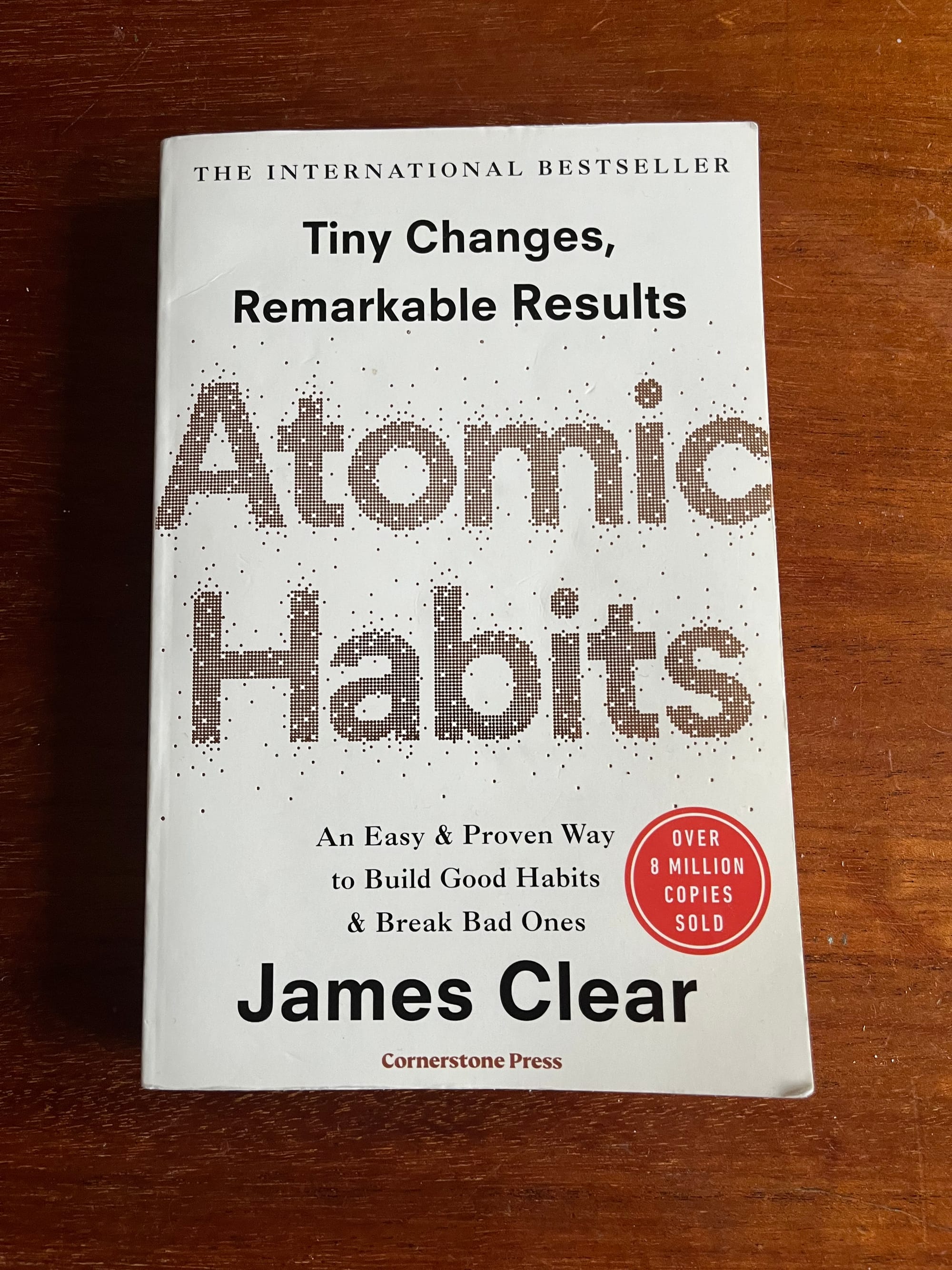Atomic Habits (James Clear) - Book Summary, Notes & Lessons

Atomic Habits has been a best-seller among non-fiction books for many years and it is a book I think is well worth reading! James Clear shows the reader how to harness the power of habits to lead a more successful and rewarding life. The book's key idea is that incrementally improving will create drastic improvement through the power of compounding over time. To achieve these improvements the reader is introduced to the concept of atomic habits. James Clear defines these two terms as seen below in his book:
Atomic
- an extremely small amount of a thing; the single irreducible unit of a larger system.
- the source of immense energy or power.
Habit
- a routine or practice performed regularly; an automatic response to a specific situation.
⏳The Book in 3 Sentences
- Habits are the compound interest of self-improvement.
- Focus on building systems instead of setting goals.
- Aim to become 1% better every day, small improvements over time will compound into fantastic results.
🎨Impressions
Atomic Habits is a self-help book with the stated purpose of helping you "build good habits and break bad ones". The book uses popular psychology and anecdotes collected by the author James Clear regarding the power of small improvements and how we can create systems to achieve them. I have read the book twice and believe that the book contains powerful frameworks through which we can view the world.
The first time I read the book I felt as if I learned a lot of valuable lessons regarding self-improvement and the power of compounding. Having a mental model of compounding has been valuable in many domains of my life such as my finances, my fitness journey, and even starting to write online. I have carried with me the knowledge of how powerful making a 1% improvement every day is. This model has helped me tremendously on my journey to learn new things and become better across domains.
On my second read-through what stood out to me was the power of the environment and the people you surround yourself with. Creating an environment that facilitates the behavior you want to have makes it much easier to achieve. Similarly surrounding yourself with people who already have a behavior you want to model will make it much easier for you to take on the same behavior. It is
📖Who Should Read It?
The book is a great read for anyone trying to improve in any domain of life. It contains actionable and insightful advice based on psychology regarding human behavior. As with most self-help books, it can feel a little bit preachy at times but I do feel that most importantly it gives you the tools to implement behaviors yourself which I enjoyed more than the cookie-cutter approach you can sometimes come across.
👩🏫Lessons I Have Learned
How my life / behavior / thoughts / ideas have changed as a result of reading the book.
- Focus on finding small wins you can achieve consistently. If you manage to build a good habit it will take you extremely far.
- After reading this book for the first time I started to focus more on building the right systems than my goals. If you have the right systems you will reach your goals.
- I strive to create an environment that sets me up for success. Examples for me are I go to the gym that is the closest to where I live to avoid excuses and I try to go to school to study since there are fewer distractions.
📝Summary + Notes
James Clear is an online writer and author who has dove deep into the world of self-improvement and habits. James realized the power of habits in college when he implemented new habits that enabled him to reach success both in the world of academics and athletics.
James lived the lessons from this book and experienced the improvements he describes in the book. In his words, he "fulfilled his potential" and believes that Atomic Habits will help the reader do the same. I am inclined to believe the same and will share some of my key lessons here below. The book is a guide to building better habits and systems in your life and it can be useful in many domains.
1. Aim to become 1% better every day
We all tend to underestimate the power of compounding. 1% every day might make it sound like you are not making any improvements but over the course of a year that would be more than a 37x improvement (1.01^365 = 37.783...). The number is not important, but the concept is. We all tend to underestimate what we can achieve in the long term and therefore focus on the short term. But the secret to exceptional results is small and consistent improvement over a long time.
As Steph Smith writes in her amazing article How to Be Great? Just Be Good, Repeatably greatness is achieved by showing up consistently and being good. The difference between the great and the good is that the great sustain being good consistently over a long time. So focus on the small things that will set you up for success and keep doing them.
"Habits are the compound interest of self-improvement"
2. Build systems that will set you up for success and success will follow
Having declared that small consistent improvements are the way to go, how is that achieved? By building systems that will allow you to do that. Instead of being goal-oriented, we should strive to be process-oriented. Thus by building systems that set us up for success, we are much more likely to put in the work that is required to succeed.
Having the right structure in place will allow you to focus on the things that are most important to be successful. This will help you ensure that the input is of good quality and then the output will also be good. When we put in the work the results will come over time and this is what systems will help you achieve.
"You do not rise to the level of your goals. You fall to the level of your systems"
"Instead, 'disciplined' people are better at structuring their lives in a way that does not require heroic willpower and self-control"
"Fix the inputs and the outputs will fix themselves"
3. Your environment plays a big role in your behavior
This means both your physical environment and social environment. As humans, we tend to imitate others and if you spend a lot of time with people who value fitness and live a healthy lifestyle you are much more likely to do the same for instance. So think about the people you surround yourself with. Spending time with people who embody things you admire and want to emulate will make it easier to embody those skills and qualities.
When it comes to our physical environment it can be highly beneficial to create an environment that lends itself to behaviors you want to have. Our habits are triggered by cues we come across and having an environment with a lot of cues for good habits will help you implement them. Similarly removing the cues for bad habits will help you avoid those behaviors.
"Environment is the invisible hand that shapes human behavior"
4. "Goldilocks Rule"= Work on challenges right outside your ability
Humans thrive when we work on problems and challenges that are right outside our current set of abilities. This is because we are built to grow and growth happens as we solve those challenges. The problems can't be too hard however so that we get discouraged. When we find this zone we are much more likely to enter a "flow" state, the feeling of being "in the zone".
"The greatest threat to success is not failure but boredom."
